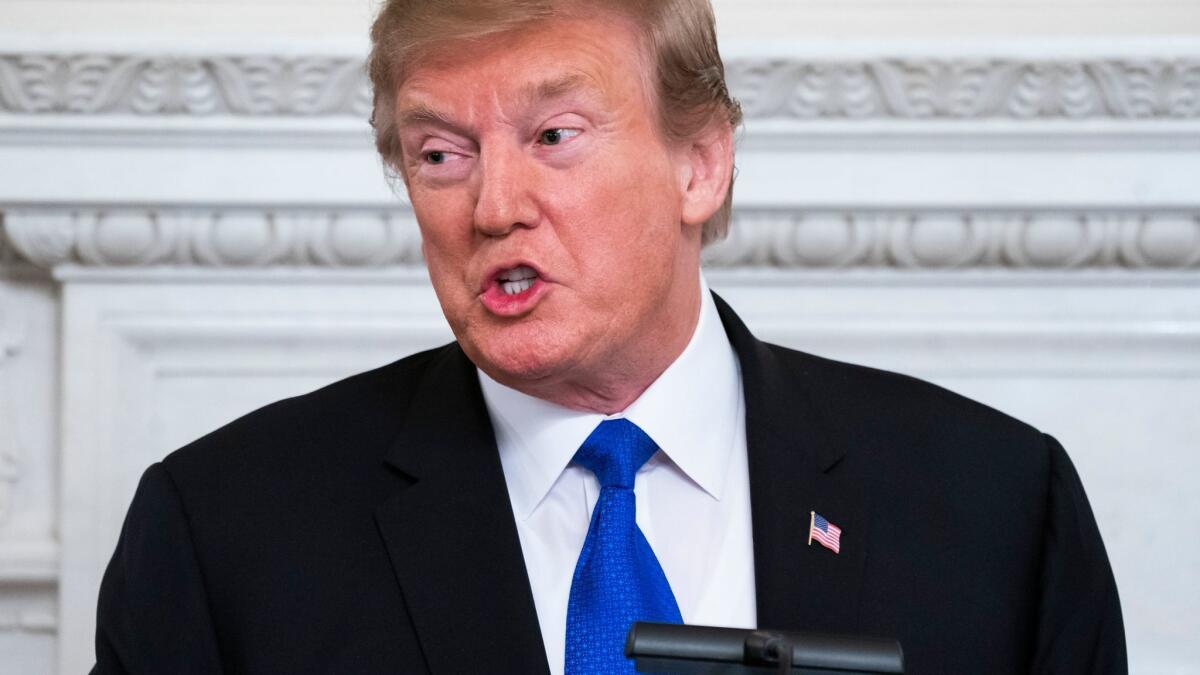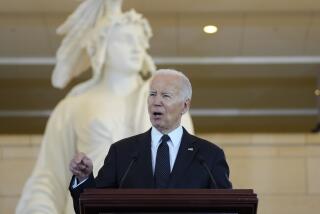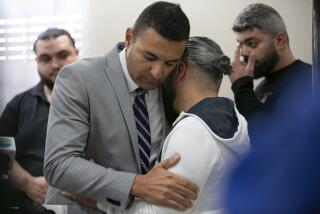Editorial: Domestic terrorists can be prosecuted without a new federal law

After a shooting spree in El Paso, allegedly by a man who railed against the “Hispanic invasion of Texas,” even President Trump, who has used similar language, acknowledged that racism, bigotry and white supremacy are “sinister ideologies” that “must be defeated.” Trump was only confirming what law enforcement officials realized long ago: Violent white supremacists pose a major threat comparable to that presented by foreign terrorists and their U.S. sympathizers.
Legislation was introduced in Congress in March that calls for the establishment of domestic terrorism units in the Justice and Homeland Security departments and the FBI as well as the creation of a Domestic Terrorism Executive Committee. But some have called for more sweeping legislation to ensure that the FBI could investigate domestic terrorism as aggressively as it does terrorism with international connections. Congress needs to proceed cautiously on any such proposals.
Domestic terrorism motivated by racial or religious hatred is undoubtedly a pressing problem. Michael C. McGarrity, the FBI’s assistant director for counterterrorism, told the House Homeland Security Committee in May that “there have been more arrests and deaths caused by domestic terrorists than international terrorists in recent years” and that racially motivated extremists were responsible for “the most lethal incidents.”
It’s also true that, while federal law contains a definition of domestic terrorism, there is no statute that makes all domestic terrorism a federal offense with prescribed penalties. This week the FBI Agents Association, representing more than 14,000 active and former agents, reiterated its call for such a statute.
But Congress could run into constitutional problems if it seeks to combat suspected domestic terrorism using the same legal tools employed against foreign terrorist groups. Besides, it’s not clear that the laws already on the books prevent the FBI from aggressively investigating violent white supremacists or other domestic terrorists, or that they unduly hamper the U.S. Justice Department in prosecuting them.
David Cole, the legal director of the American Civil Liberties Union, told The New York Times that proposals for a new domestic terrorism law “tend either to be duplicative of laws that already exist or expansive in ways that violate 1st Amendment rights of speech and association.” An analysis by the Brennan Center for Justice at New York University Law School notes that “there are already dozens of federal statutes carrying severe penalties that are available to investigators and prosecutors pursuing these crimes.”
For example, acts of domestic terrorism motivated by racial or religious hatred can be prosecuted under the federal hate-crime statute and other laws. Robert Bowers, accused in the shooting at a Pittsburgh synagogue that killed 11 people, was charged by the Justice Department with hate crimes as well as other offenses including 11 counts of “obstruction of free exercise of religious beliefs resulting in death,” a crime that can lead to the death penalty.
Although federal law lacks a catchall criminal offense of domestic terrorism, Robert Chesney of the University of Texas Law School points out that several federal terrorism-related statutes, including one dealing with the use of explosives, apply in cases of home-grown violent extremism. Timothy McVeigh, who perpetrated the 1995 bombing of the Oklahoma City federal building that killed 168 people and injured several hundred more, was convicted of federal charges including use of a weapon of mass destruction and murdering federal agents.
Those who are calling for a new domestic terrorism statute argue that there are still gaps in federal law, including the inability of the Justice Department to prosecute some acts of domestic terrorism committed with some categories of firearms. Congress should determine whether that is actually a problem, but it needs to do so in a deliberative way.
Congress also needs to recognize that some approaches to the investigation of foreign terrorism raise constitutional questions when applied to domestic activities. For example, it’s a crime for Americans to provide “material support or resources” to designated foreign terrorist organizations. But criminalizing support for domestic political groups, however extreme, could threaten speech protected by the 1st Amendment and the designations themselves might be subject to a constitutional challenge. Testifying before the House Homeland Security Committee, Deputy Assistant Atty. Gen. Brad Wiegmann acknowledged that “picking out particular groups [whose views] you say you disagree with ... is going to be highly problematic.”
Some advocates of new federal legislation admit that their purpose is to send a message that Congress and the nation deplore terrorist acts by white nationalists as much as they do acts of violence committed by Islamic extremists. That is an important message, and one that Trump has been shamefully slow to embrace. But legislation is about more than symbolism; it has practical consequences.
The best way to demonstrate that the federal government is serious about terrorism by white nationalists, anti-Semites and other bigots is for the Justice Department and the FBI to make full use of the ample authority they already possess.
More to Read
A cure for the common opinion
Get thought-provoking perspectives with our weekly newsletter.
You may occasionally receive promotional content from the Los Angeles Times.










